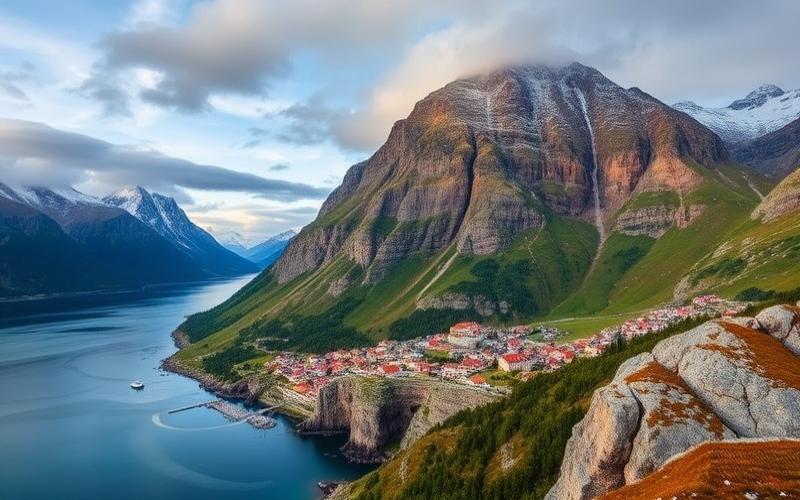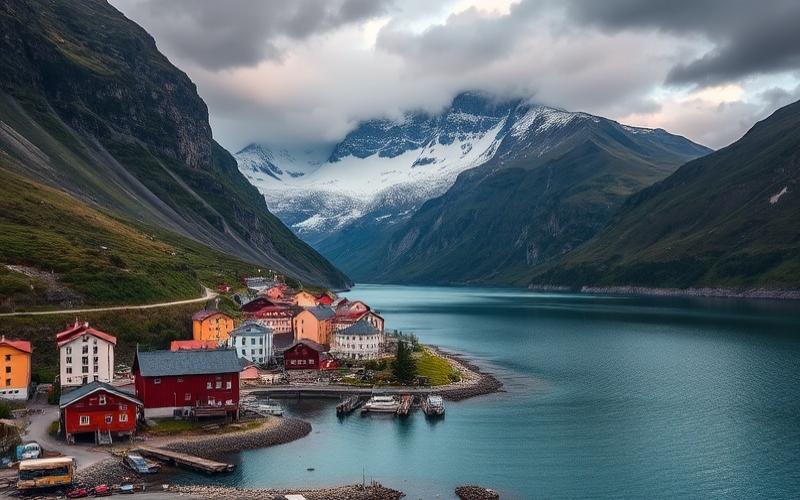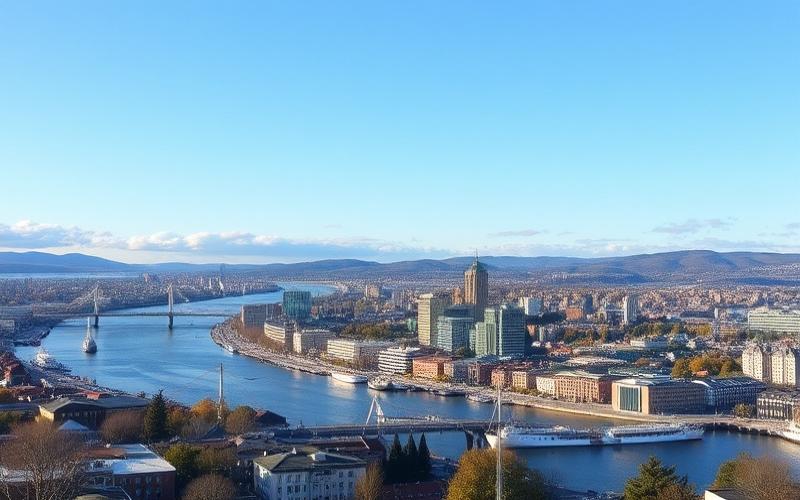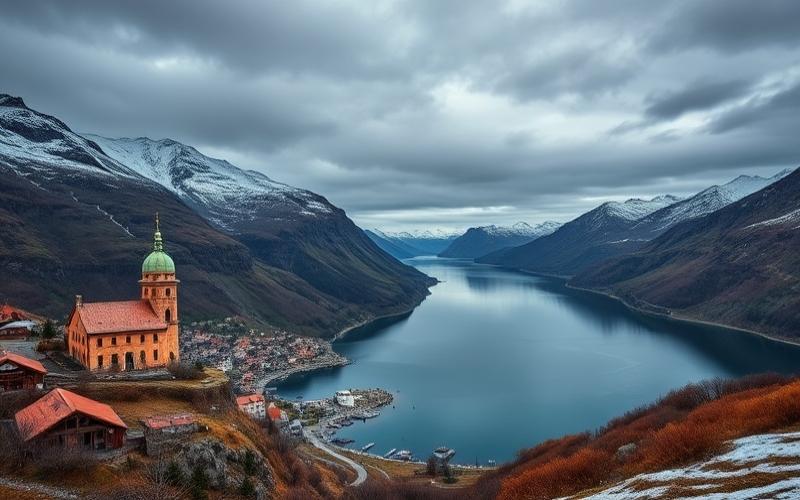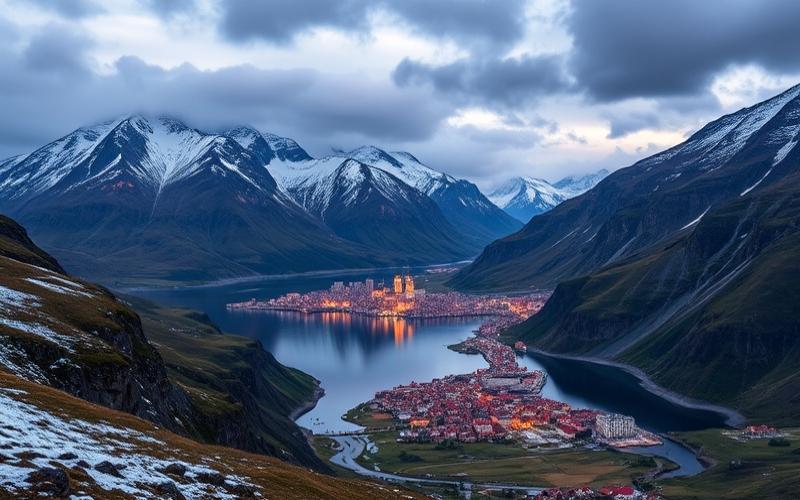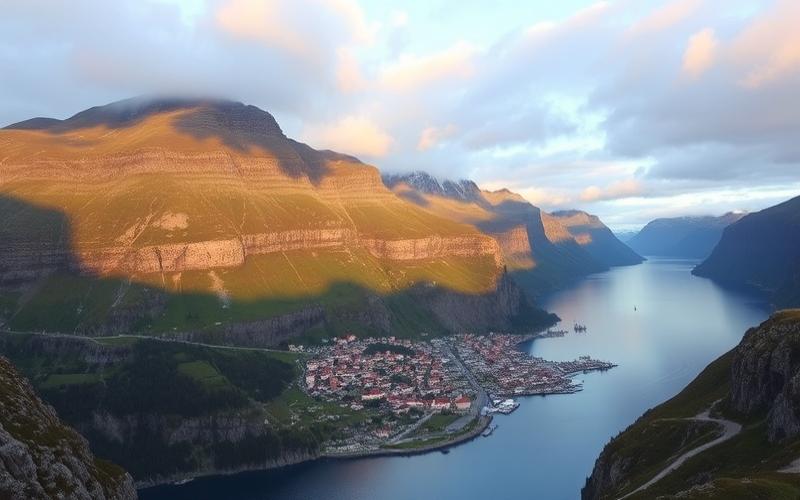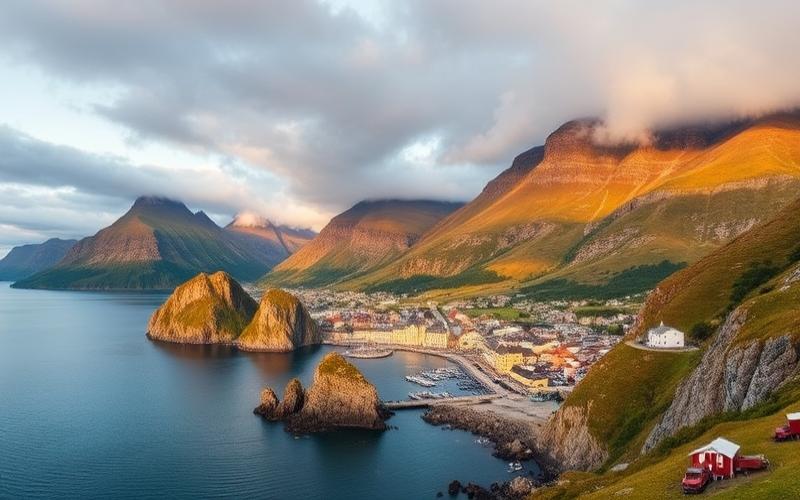
 Published on and written by Cyril Jarnias
Published on and written by Cyril Jarnias
Relocating to Norway involves much more than simply changing your residence; it also means immersing yourself in a rich and diverse culture where religious practices play a fundamental role.
To fully understand and appreciate your new environment, it’s essential to familiarize yourself with the local customs and traditions (religious holidays, rites, and ceremonies) that shape the daily lives of Norwegians.
This guide for expatriates will provide you with an overview of the country’s specific beliefs and spiritual practices, from expressions of Christianity, the dominant religion, to the minority but equally captivating rituals of other faiths present in the territory.
By becoming aware of how these elements influence social interactions and life rhythms in this Scandinavian region, you’ll be better prepared to navigate with sensitivity and respect within your new community.
Understanding Religious Diversity in Norway
Norway exhibits growing religious diversity, although Lutheran Christianity remains largely predominant. Recent developments show significant secularization and diversification of beliefs due to immigration and modern thought movements.
| Main Religion | Estimated % of Population (2021-2024) |
|---|---|
| Church of Norway (Lutheran) | 65–75% |
| Other Christians (Catholic, etc.) | 5–7% |
| Muslims | 3–6% |
| Buddhists | 0.4–0.6% |
| Hindus | 0.5% |
| Other Religions | 0.2–2.6% |
| Unaffiliated/No Religion | 10–20% |
Evolution and Historical Factors:
- Christianization around the year 1000, then Lutheran state religion until the 20th century.
- Secularization gradually since the 1960s, with a rapid decline in practice and membership in the Church of Norway.
- Immigration: notable growth of Muslim, Hindu, and Buddhist communities since the 1970s, linked to the arrival of refugees and foreign workers.
- Secular and Humanist Movements: rise of irreligion and the Norwegian Humanist Association, influencing public debate and legal framework.
Legal Framework and Secularism:
- Freedom of religion guaranteed by the Constitution (amended in 1964), except for the royal family, who must remain Lutheran.
- Gradual separation of Church and State: the Church of Norway is no longer a state religion since 2017.
- Religious Communities Act (2020): equal treatment of recognized religions and philosophies, public subsidies based on membership numbers.
- Norwegian secularism: tolerance, state neutrality, but Christian and humanist heritage affirmed in the Constitution.
Participation and Engagement in Society:
- Low religious practice: less than 12% of Norwegians regularly attend religious services.
- Active presence of religious and humanist associations, organizing ceremonies, debates, festivals, and charitable actions.
- Places of worship: Lutheran churches, mosques, Buddhist and Hindu temples, synagogues in Oslo and Trondheim.
- Community events: Christian holidays (Christmas, Easter), Ramadan, Diwali, Vesak, as well as secular events (humanist confirmation ceremonies).
Practical Tips for Expatriates:
- Respect discretion: religion is often considered a private matter in Norway.
- Avoid discussing faith during initial encounters, unless the topic is freely introduced.
- Participation: it’s generally possible to attend services or community events, often open to non-members, especially during major religious holidays.
- Get information from associations or cultural centers to discover or participate in celebrations (Norwegian Christmas, Ramadan, Hindu or Buddhist festivals).
- Take into account official holidays linked to the Christian calendar, which structure social and professional life.
- Adopt an open and tolerant attitude, respecting dress codes or dietary rules specific to each tradition when visiting places of worship.
Good to Know:
Norway guarantees freedom of religion, with Lutheran Christianity as the dominant religion, followed by Islam and other religious minorities; expatriates are encouraged to visit various places of worship to better understand local customs. Thanks to societal evolution, many community events are open to non-members, offering a valuable opportunity for intercultural engagement.
In Norway, religious diversity is increasing, driven by immigration and secularization, within a legal framework guaranteeing freedom of conscience and Nordic-style secularism. Society values tolerance, discretion, and openness to different religious or philosophical expressions.
Main Religious Holidays and Their Impact on Daily Life
Main Religious and National Holidays in Norway
| Holiday | Date | Religious/Cultural Significance | Traditions and Public Manifestations | Impact on Daily Life | Participation of Non-Practitioners |
|---|---|---|---|---|---|
| Christmas (Jul) | December 24-25 | Celebration of Jesus’ birth, merged with the ancient pagan “Jol” (Midtvintersblot) | Decorations, songs, circling the Christmas tree, gifts, candles, nissegrøt offered to the nisse, traditional meal (rice pudding, lutefisk, pork, julekake), Christmas markets, concerts, gatherings | Store closures (often from noon on the 24th), reduced transport schedules, school and work holidays, many Norwegians travel to reunite with family | Easy welcome for expatriates, participation in meals, markets, songs, and festivities without religious obligation |
| Easter (Påske) | March/April (variable dates) | Christian feast of Christ’s resurrection | Holy Week, yellow decorations, Easter eggs, mountain stays (skiing, cabins), simple meals, reading crime novels (Påskekrim), chocolate sales | Store closures during Maundy Thursday, Good Friday, Easter Sunday and Monday, schools closed, adapted transport | Expatriates can participate in mountain vacations, meals, and social activities without religious obligation |
| Constitution Day (May 17, Grunnlovsdagen) | May 17 | National holiday, commemoration of the 1814 Constitution | Children’s parades, brass bands, traditional costumes (bunad), official speeches, flags, family gatherings, festive meals (ice cream, hot dogs, cakes) | Public holiday, closure of most stores, disrupted transport in city centers, schools closed, mandatory participation in parades for children | Everyone participates, expatriates encouraged to attend or join festivities, wear bunad or elegant clothing, display Norwegian flag |
Traditions and Practical Tips for Expatriates
- Respect holidays: Plan your shopping and travel in advance, as stores close early or are completely closed during major holidays, and transport schedules are often reduced.
- School and work life: Schools and many workplaces close during Christmas, Easter, and May 17. It’s common to take family vacations during these periods.
- Meals and conviviality: Traditional meals are at the heart of celebrations. Even without religious convictions, it’s welcome to share julemat at Christmas or cakes and ice cream on May 17.
- Public events: Parades, concerts, and markets are open to all. Expatriates can actively participate, respecting local customs (greeting, singing, wearing festive colors).
- Integration of non-practitioners: Celebrations are mostly cultural and inclusive. Expatriates can offer greetings, participate in family activities and public gatherings without religious obligation.
- Cultural differences:
- Christmas is celebrated on the evening of the 24th, not the morning of the 25th.
- Pagan and Christian traditions are often mixed.
- May 17 is a patriotic, non-religious holiday that brings together the entire society.
- Easter is sometimes more family-oriented and leisure-focused than in France, with particular importance given to skiing and nature stays.
Recommendations for Successful Adaptation
- Plan to participate in meals and events, even as an observer.
- Respect local schedules and inquire about closures and service modifications.
- Be open to discovering customs: accept an invitation, taste typical dishes, attend a concert or parade.
- Don’t hesitate to ask questions about the meaning of rites and express your interest in Norwegian culture.
- Keep in mind that conviviality and inclusion are central values during Norwegian holidays.
Good to Know:
Norwegian holidays are the ideal opportunity to build connections and discover the country’s identity. The openness and simplicity of traditions allow everyone, regardless of origin, to fully integrate into celebrations.
In Norway, May 17 is celebrated with large parades, stores are often closed during Christmas and Easter, and buses may have reduced schedules; expatriates can participate by wearing the local bunad or tasting lutefisk. Make sure to adjust your schedule as some schools and offices partially close during these holidays.
Behaviors to Adopt During Celebrations and Rituals
Respecting local traditions and customs during religious celebrations in Norway is essential to demonstrate a respectful and discreet attitude, while avoiding cultural blunders. Such an approach promotes integration, mutual understanding, and the smooth running of festivities for all participants.
Main Rituals and Religious Holidays in Norway:
| Holiday/Ritual | Significance | Way of Celebrating |
|---|---|---|
| Christmas (Jul) | Birth of Christ, family tradition | Family reunions, traditional meals, songs, decorations inspired by Norse mythology |
| Easter (Påske) | Resurrection of Christ | Vacations, mountain stays, decorated eggs, crime novel readings (“påskekrim”) |
| Saint Olaf (Olsok) | Commemoration of King Olaf II, patron saint of Norway | Masses, processions, visits to Nidaros Cathedral in Trondheim |
| Religious Wedding | Sacred union under Lutheran influence | Ceremony in church or stave church, songs, prayers, traditional attire (bunad) |
Christian Celebrations:
- Christmas is primarily a family holiday, blending Christian rites and ancient Norse beliefs.
- Easter is marked by an atmosphere of retreat and conviviality: many Norwegians go to the mountains with family.
- Other holidays, such as Ascension or Pentecost, remain public holidays and involve religious services and family gatherings.
Tips for Participation in Religious Services:
Dress Code:
- Wear modest and neat clothing, avoid overly bright colors or casual attire.
- During important ceremonies, it’s common to see Norwegians in traditional costume, the bunad.
Greetings and Conduct:
- Be discreet when entering and exiting the church.
- Greet with a nod or smile, avoid speaking loudly or moving unnecessarily during the service.
- Respect moments of silence and follow the ritual progression, even without active participation.
General Behavior:
- Avoid taking photos without permission.
- Sit where indicated and wait until the end of the ceremony to interact with participants.
Specific Sami Customs:
The Sami, indigenous people of northern Norway, often blend Christianity and ancestral traditions.
Traditional Sami rituals are centered on nature, spirits, and the role of the shaman (noaidi), with practices sometimes very different from Christian services.
Expatriates should inquire about specific codes:
- Respect the surrounding nature, often sacred.
- Do not interrupt or photograph rituals without consent.
- Adopt an attitude of listening and restraint, and if possible, ask a community member about rules to follow before participating.
Significance and Respectful Integration:
These rituals and celebrations strengthen community bonds and transmit fundamental cultural values, such as solidarity, ancestral memory, and respect for nature.
To integrate respectfully:
- Research in advance the meaning of holidays and gestures.
- Prioritize observation and active listening.
- Participate with modesty, without seeking to impose one’s own practices.
- Showing interest in local culture enriches one’s own experience and builds authentic connections with residents.
Adopting a respectful and discreet attitude during religious celebrations in Norway is not only a mark of politeness, but also the key to harmonious integration and an enriching intercultural experience.
Good to Know:
Respect Norwegian customs during Christmas and Easter by opting for modest attire and adopting a discreet attitude during religious services; learn about Sami traditions to better understand and honor their sacred rituals.
Religious Freedom and Resources for Expatriates
Religious freedom in Norway is guaranteed by the Constitution, which states that all inhabitants of the kingdom have the right to freely practice their religion. Since 2012, the Evangelical Lutheran Church is no longer considered the State Church, although it remains supported by the state on equal terms with other religious groups. Norwegian laws protect equal treatment among all religions and prohibit discrimination based on religious beliefs.
Main Religions Practiced in Norway
| Religion | Estimated Percentage of Population | Cultural and Social Influence |
|---|---|---|
| Evangelical Lutheran Church | Majority (~70%) | Christmas celebrations, civil rites, national holidays |
| Various Protestantisms | ~6.4% | Presence of various parishes |
| Islam | ~3.8% | Mosques, Muslim holidays, increased visibility in major cities |
| Humanism (secular association) | ~1.7% | Non-religious events and ceremonies, influence on education |
| Catholicism, Orthodoxy | Minorities | Churches, monasteries, private schools |
| Others (Buddhism, Judaism…) | Minorities | Cultural centers, places of worship |
| No religious affiliation | Significant proportion | Marks the country’s secularization process |
Influence on Daily Life and Culture
- Christian religious holidays (Christmas, Easter) remain very present in the school and professional calendar.
- Norwegian society values tolerance and equality, but religion remains a sensitive topic, particularly in education and public policies.
- A strong trend toward secularization is reflected in a decline in regular religious practice.
Resources for Expatriates Practicing Their Faith
- Places of worship: Christian churches (Lutheran, Catholic, Orthodox), mosques, synagogues, Buddhist and Hindu temples are present in major cities (Oslo, Bergen, Trondheim).
- Organizations dedicated to foreigners:
- International parishes (Catholic, Protestant, Orthodox) with masses and services in English or other languages.
- Muslim associations offering specific services for newcomers.
- Jewish and Buddhist community centers open to expatriates.
- Support networks:
- Facebook groups and online forums to find local religious communities.
- Interfaith organizations promoting dialogue and integration.
- Psychological and social support offered by chaplains in certain institutions (universities, hospitals).
Impact of Religious Diversity on Norwegian Society
- The coexistence of different religions enriches the Norwegian cultural landscape and encourages intercultural dialogue.
- Expatriates contribute to this mosaic by bringing new traditions, holidays, and spiritual perspectives.
- Legislation protects freedom of practice while ensuring that religious expression does not contravene principles of equality and non-discrimination.
To Contribute Positively to This Diversity, Expatriates Can
- Get involved in interfaith events and community activities.
- Respect local rules while sharing their own traditions.
- Foster mutual understanding within neighborhoods and public spaces.
Good to Know:
In Norway, religious freedom is protected by the Constitution, with equal rights for all communities; expatriates can find varied places of worship and join networks like Catholic Church communities or Islamic centers to stay connected to their faith. Main religions include Christianity and Islam, influencing local celebrations and traditions, while expatriates, through their cultural diversity, enrich this religious mosaic.
Disclaimer: The information provided on this website is for informational purposes only and does not constitute financial, legal, or professional advice. We encourage you to consult qualified experts before making any investment, real estate, or expatriation decisions. Although we strive to maintain up-to-date and accurate information, we do not guarantee the completeness, accuracy, or timeliness of the proposed content. As investment and expatriation involve risks, we disclaim any liability for potential losses or damages arising from the use of this site. Your use of this site confirms your acceptance of these terms and your understanding of the associated risks.


